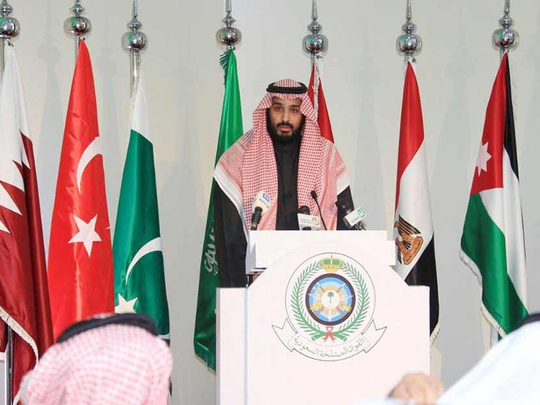
Dubai: The announcement by Saudi Arabia of the formation of an Islamic antiterrorism coalition is now being parsed by analysts who are now examining the details of the proposal and its consequences.
The coalition is made up of 34 nations but excludes three regional countries: Iraq, Syria and Iran. This omission, analysts believe, will only further deepen Sunni-Shiite tensions in the Arab region.
And just what definition exactly defines a terrorist group is also the subject of debate, with analysts inclined to adopt a “wait-and-see” approach, giving the perceptions of individual nation states in the 34-member alliance.
Commenting on the criteria of choosing the member states, Mustafa Al Ani, the Director of the Department of Security and Defence Studies at the Geneva-based Gulf Research Centre, said “it was according to an invitation from the sponsoring country (Saudi Arabia) to nearly 50 countries.”
“It was decided to establish this coalition outside the Organisation of Islamic Countries (OIC) because there are countries that are sponsoring terrorism, such as Syria and Iran, and they are members of OIC, and they are not welcomed,” added Dubai-based Al Ani in an interview with Gulf News.
“There is a Shiite terrorism, and some of the Shiite organisations that are supported by Iran have not been subjected to the accountability that other Sunni groups, such as Al Qaida, Daesh and Al Nusra,” he said.
Yet, the new coalition can’t be considered an anti-Shiite alliance, Al Ani stressed, noting that some of the Shiite groups are listed under different western terrorism lists, as well as Arab lists.
“This is not because they are Shiites,” he said. “It is because of their manners and behaviour.”
However, the increasing tension between Sunni and Shiites in the region, is leading other analysts to assess that the new coalition is actually a reflection of this tension.
During the past few years, Iran has been accused by many Arab countries of interfering in their internal affairs and supporting the Shiite groups in these countries.
“No matter what the intention is behind this coalition, many people are going to take it as a reflection of this Sunni- Shiite division in the region,” said Gokhan Bacik, political scientist and columnist in Turkish newspaper, Today’s Zaman.
“On one hand, hypothetically, Iran should be somewhere in the coalition, but on the other hand, technically speaking, it is not possible,” the Turkish analyst told Gulf News.
The formation of the new alliance was announced by Saudi defence minister and deputy crown prince, Mohammad Bin Salman. He said the member states would work together to target “any terrorist organisation, not just [Daesh]” in countries including Iraq, Syria, Libya, Egypt and Afghanistan.
Apart from Saudi Arabia, Egypt and Turkey, the new coalition includes also Qatar, UAE, other Middle Eastern, African and Asian countries, including Pakistan, Malaysia and Nigeria.
While all the member states have agreed on defining Daesh as a terrorist group, they have different views on other groups and organisations. And just how this fact is going to have an impact on the new coalition is yet to be seen, analysts said.
“To what extent the Saudi shares the same views with other members on who is a terrorist organisation and who is not is not clear,” said Eman Ragab, an expert in regional security at Cairo-based Al Ahram Strategic Studies Centre.
Different countries have different views, analysts said.
For example, while the Muslim Brotherhood is considered a terrorist group in Egypt and UAE, it is not listed as a terrorist organisation in Saudi Arabia.
While the Kurdish Groups in Syria are considered terrorist group in Turkey, they are not considered as such by many other countries.
“I believe Saudi Arabia will seek to issue a list under the auspices of the United Nations,” Al Ani told Gulf News.
Moreover, analysts believe the new coalition needs to use different ways of confronting terrorism, especially that terrorist groups have started to emerge in new forms.
“Terrorism has moved to a new era,” Al Ani said. “Terrorists are establishing states, borders, armies and capitals.”
Bombing only will destruct the public order and create more terrorist groups, said Bacik.
“Only a gradual strategy has a chance in the region,” he added, explaining that the new coalition should start fighting one group at a time.
At the same time, “depending on the military tool alone will not eliminate terrorism,” said Ragab. More attention should be given to obliterate the extremist thoughts which feed these groups, she added.








